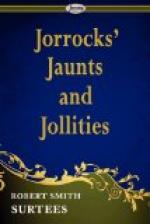Most of the inmates of the house were up with the lark to the early exercises, and the Yorkshireman was as early as any of them. Having found Mr. Jorrocks’s door, he commenced a loud battery against it without awaking the grocer; he then tried to open it, but only succeeded in getting it an inch or two from the post, and after several holloas of “Jorrocks, my man! Mr. Jorrocks! Jorrocks, old boy! holloa, Jorrocks!” he succeeded in extracting the word “Wot?” from the worthy gentleman as he rolled over in his bed. “Jorrocks!” repeated the Yorkshireman, “it’s time to be up.” “Wot?” again was the answer. “Time to get up. The morning’s breaking.” “Let it break,” replied he, adding in a mutter, as he turned over again, “it owes me nothing.”
Entreaties being useless, and a large party being on the point of setting off, the Yorkshireman joined them, and spent a couple of hours on the dew-bespangled heath, during which time they not only criticised the figure and action of every horse that was out, but got up tremendous appetites for breakfast. In the meantime Mr. Jorrocks had risen, and having attired himself with his usual care, in a smart blue coat with metal buttons, buff waistcoat, blue stocking-netted tights, and Hessian boots, he turned into the main street of Newmarket, where he was lost in astonishment at the insignificance of the place. But wiser men than Mr. Jorrocks have been similarly disappointed, for it enters into the philosophy of few to conceive the fame and grandeur of Newmarket compressed into the limits of the petty, outlandish, Icelandish place that bears the name. “Dash my vig,” said Mr. Jorrocks, as he brought himself to bear upon Rogers’s shop-window, “this is the werry meanest town I ever did see. Pray, sir,” addressing himself to a groomish-looking man in a brown cut-away coat, drab shorts and continuations, who had just emerged from the shop with a race list in his hand, “Pray, sir, be this your principal street?” The man eyed him with a mixed look of incredulity and contempt. At length, putting his thumbs into the arm-holes of his waistcoat, he replied, “I bet a crown you know as well as I do.” “Done,” said Mr. Jorrocks holding out his hand. “No—I won’t do that,” replied the man, “but I’ll tell you what I’ll do with you,—I’ll lay you two to one, in fives or fifties if you like, that you knew before you axed, and that Thunderbolt don’t win the Riddlesworth.” “Really,” said Mr. Jorrocks, “I’m not a betting man.” “Then, wot the ’ell business have you at Newmarket?” was all the answer he got. Disgusted with such inhospitable impertinence, Mr. Jorrocks turned on his heel and walked away. Before the “White Hart” Inn was a smartish pony phaeton, in charge of a stunted stable lad. “I say, young chap,” inquired Jorrocks, “whose is that?” “How did you know that I was a young chap?” inquired the abortion turning round. “Guessed it,” replied Jorrocks, chuckling at his own wit. “Then guess whose it is.”




